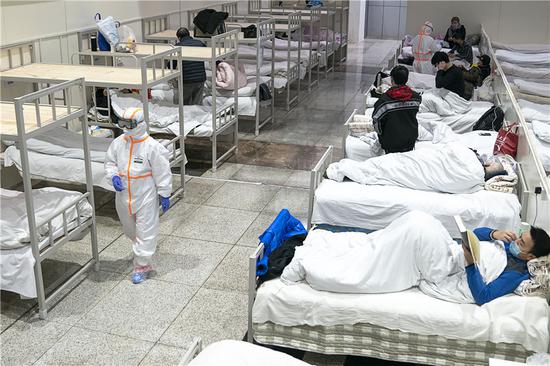THE WHO, IN GENEVA, ACTS AS P.R. AGENCY FOR SECRECY-OBSESSED CHINA
The behaviour of the WHO was odd. Since new diseases often develop in Chinese industrial meat factories, and since the WHO had excellent relations with China, one would have expected a WHO presence in Peking. Apparently, there wasn't any.
For weeks, the WHO denied that the novel pneumonia was spread person to person; it claimed that the virus came from a bat to a palm civet trapped and kept for sale and butchering at the Wuhan wet market.
There was no evidence for that, except for the fact that the joyous birth of the SARS disease in 2003, was thought to have occurred in that manner. SARS is the Severe Acute Respiratory Syndrome, caused by the SARS-CoV-1 virus.
The conditions of the animals were atrocious; this was a clear and present threat to the soul and body of humanity, and could have been resolved by hiring trappers as forest guards, in Indochina and South China. Problems is that most governments prefer creating and studying problems over solving them.
For two weeks, the WHO denied that the new illness was contagious. On January 14, Dr. Van Kerkhove said that there may have been "limited human-to-human transmission." On the same day, there was a private teleconference between Chinese leaders, at which it was agreed they had a grave situation on their hands. For two weeks, the WHO had acted as if it were the public relations agency for the out-of-touch mayor of Wuhan, who was then very busy organising traditional New Year potluck banquets.
Doctors and nurses in Wuhan told Chinese media there were plenty of signs that the coronavirus could be transmitted between people as early as late December. Patients who had never been at the Huanan Seafood Market, were infected.
When medical workers started falling ill, officials obstructed medical staff who tried to report such cases... As a result, no new cases were reported for almost two weeks from Jan. 5. https://apnews.com/article/virus-outbreak-health-ap-top-news-international-news-china-clamps-down-68a9e1b91de4ffc166acd6012d82c2f9
A most respected elderly professor agreed to go public and revealed to the media that China and the world had a problem. The professor was later punished, by cutting his funds, but finally there was movement in Peking. It was very slow, as if they wanted to allow the traditional travel to the home village to bring the plague to every angle of the country.
The Chinese New Year city-wide banquets were held in Wuhan on January 18. Later, the Mayor explained that he had been told that there was no human-to-human spread. For weeks, China seemed to be holding a Chinese fire drill—that’s a slang term for a situation that is chaotic, possibly due to poor or misunderstood instructions. On January 20, President Xi said that “People’s lives and health should be given top priority and the spread of the outbreak should be resolutely curbed.” Still, nothing moved. Were they fearful of interfering with the traditional banquets and travel to the home village?
CHINA WAKES UP
On January 23, the leadership in Peking moved, locking down the areas in crisis—less than 5% of the country—and started building two new 1000-bed hospital, completed in ten days. More important, they started treating the illness with herbal medicine and with the antimalarial chloroquine, a synthetic analog of quinine. All light to moderate patients, 13,000 of them, were housed and treated in 16 field hospitals created in stadiums.

By March 1, thousands of Chinese medical workers, who had arrived in Wuhan from the rest of China, began to fly home. Soon, the Wuhan Covid variety was eliminated in China; all new cases came from Europe or from America.
That was a success as total as the Western lockdowns were total failures.




